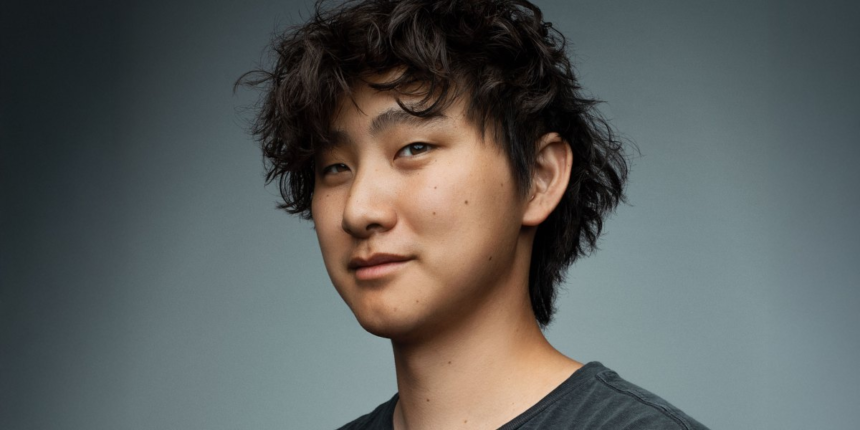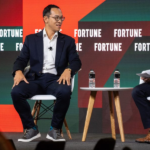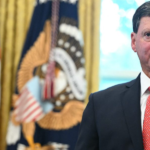This AI dream team, and Wang’s role as its captain, mark the latest chapter in a Silicon Valley narrative that’s practically a cliché by now: a new wunderkind rising in tandem with the next world-changing technology. In this case, however, rather than disrupting the old guard, Wang is leaping to action to help an established tech giant, which happens to be run by the previous generation’s whiz kid.
“I’m focused on building the most elite and talent-dense team in the industry,” Zuckerberg wrote on his Threads app in July.
The goal of this extraordinary hiring spree? Most pressingly, to reverse Meta’s recent struggles in the grueling week-to-week contest for AI market share and mindshare, and to lock in Meta’s large language models at the front of the pack. But Wang and his team of super friends have also been tasked with accomplishing something far more ambitious, and something that will be much trickier to measure with ordinary KPIs: to attain the still entirely theoretical concept of “superintelligence,” leapfrogging ChatGPT-maker OpenAI—and all other frontier AI competitors—in the race to define the future of artificial intelligence.
If the word “superintelligence” conjures images of omniscient science fiction machines, you’re not too far off the mark.
There is no agreed-upon formal definition of superintelligence, though the term typically refers to an artificial intelligence that vastly surpasses human capabilities in virtually all domains, including scientific creativity, general wisdom, and social skills.
Superintelligence is generally perceived as going beyond artificial general intelligence, or AGI, which, though also vague, typically refers to an AI system with human-level intelligence across a wide range of work-related tasks. That is, it can reason, plan, solve problems, understand language, and learn in a generalizable way, much like a human. Estimates for achieving AGI vary widely, ranging from a few months to a decade or more; for superintelligence, the timeline ranges from a few years to never.
Among Silicon Valley’s leaders, the mission is spoken about with the assurance of an airplane pilot giving passengers a flight update en route to their destination.
“Developing superintelligence is coming into sight,” Zuckerberg wrote in an internal memo obtained by Fortune, though he provided no specific estimate for the date. (OpenAI CEO Sam Altman, for his part, wrote in a June blog post that humanity is now “close” to building digital superintelligence.)
Zuckerberg’s memo claimed that Meta is “uniquely positioned to deliver superintelligence to the world,” pointing to the computing power in its data centers versus smaller labs with fewer resources.
In his July Threads post, Zuckerberg touted Meta’s investments in massive, multi-gigawatt data centers with grandiose names (“Prometheus” and “Hyperion”) and mind-boggling scale: One of the data centers, Zuck boasted, will have a footprint nearly as big as Manhattan. Meta will “invest hundreds of billions of dollars into compute to build superintelligence,” Zuckerberg declared. “We have the capital from our business to do this.”
“There’s probably a handful of people in the world that you bet on,” says a former Scale AI manager. Wang is one of them.
In making Wang Chief AI Officer, Meta has chosen someone who is an entrepreneur, not a computer scientist. Even more notable is the fact that the man leading Meta’s quest for superintelligence comes from a company that was not in the business of actually building large language models.
That’s not to say that Wang—a competitive “mathlete” in high school—is a cerebral slouch. He’s “11/10 smart and ambitious” and “superspecial,” says Sarah Guo, founder of VC firm Conviction and former general partner at venture capital firm Greylock, when describing Wang. Guo (no relation to Scale AI cofounder Lucy Guo, who parted ways with Scale in 2018) got to know Scale’s founders when they launched their startup from the pool house of her Portola Valley, Calif., home.
Will Meta’s teams of AI PhDs and computer scientists be as impressed and find in Wang the inspiration that drives them to reach the land of superintelligence?
People close to Wang, including current and former Scale AI employees, investors, acquaintances, and competitors, have emphasized that Wang should not be underestimated in his ability to attract talent and lead Meta’s AI organization into the future. “There’s probably a handful of people in the world that you bet on” to build the kind of team Zuckerberg is looking for at Meta, and Wang is on that short list, says a former Scale AI manager who recently left the company. Wang “is a great recruiter, a really savvy commercial person.”
Conviction’s Guo echoes the sentiment: “I think people would be mistaken to underestimate Alex and Nat,” she says, referring to Wang and his Meta teammate Nat Friedman. “They are very, very smart, ambitious, technical people who are going to listen to their researchers. They are compelling recruiters with a lot of compute and have [Zuckerberg’s] insane force of will behind them.” An early Scale AI employee, who left in 2022, said that Wang em- bodied the startup’s credo of “Ambition shapes reality.”
Perhaps that winds back to Wang’s childhood as the son of immigrant parents who were nuclear physicists at Los Alamos National Laboratory in New Mexico. Wang, whose first name is spelled without the second “e” to give it the eight characters associated with good fortune in Chinese culture, dropped out of MIT after one year to pursue the startup dream. Wang and Guo had originally planned to create tech for a doctors’ concierge service, but after joining Y Combinator they saw an opportunity in data—specifically in the behind-the-scenes, labor- intensive work of tagging and organizing data so that AI models can learn from it.
Meta’s relationship with Scale AI dates back to 2019, when the social media company began using Scale as a data provider for its AI efforts, and Meta was among the investors in Scale’s $1 billion funding round in 2024. Zuckerberg and Wang began spending more time together beginning in April, when Zuckerberg reached out and expressed a desire to work more closely, according to a source familiar with the negotiations.
The Meta CEO began inviting Wang (who had become the world’s youngest self-made billionaire before turning 25) to meet with him at his houses in Lake Tahoe and Palo Alto, with Zuckerberg soon coming to trust Wang’s opinion. Advisors say that Zuckerberg would sometimes reference Wang’s views in conversations with them, The Information reported.
With the release of Llama 4 in April 2025, Meta’s malaise became a crisis. Allegations of possibly inflated performance metrics, a rushed release, and a lack of transparency, along with indications that Meta was failing to keep pace with open-source AI rivals like China’s DeepSeek, led many in the industry to proclaim Meta’s latest AI model a flop. (Meta has called claims that it gamed performance metrics “simply not true.”)
And so, even as Wang pushes for future superintelligence, he has the challenging near-term assignment of reinvigorating Meta’s current LLM efforts. In the Llama large language models, Meta has a valuable asset and vast resources to draw upon. But as competition intensifies, particularly with upstart rivals from China, Wang will need to make some important strategic decisions, including whether it still makes sense to keep Llama open-source, or whether the changing competitive landscape requires that Meta keep the models’ weights under lock and key.
With Wang’s firsthand experience building a successful business in the AI sector, the perspective he acquired as a neutral data provider serving the top LLM makers, and his business savvy, fans say he could be the missing ingredient to take Meta’s AI efforts to the next level.
Alex Ren, founding managing partner at Fellows Fund, says that Meta needed an entrepreneur to lead its AI organization—and it found that in Wang, as well as Friedman and Gross. Meta’s AI teams had previously been led by scientists and product managers. “That’s wrong,” says Ren, who counts several of the members of the new superintelligence team as friends. Pointing to OpenAI, and its business-oriented CEO, Sam Altman, Ren says that Meta “should really be led by founders and entrepreneurs. Alex Wang is not a researcher, he is a leader.”
With more than $164 billion in annual revenue, Meta knows all too well that it takes something truly unique to move the needle in its business. And in paying up for Wang and his team, Zuckerberg is betting that the ultimate value transcends any simple categories.
If Wang strikes some as an unconventional choice, reckons one source close to the entrepreneur, it’s because he does not fit into the typical tech-world archetypes: “Silicon Valley is good at putting people into boxes. They like to say, ‘This person is a technical person, this person is a businessperson.’ Alex is truly a man of one.”
Few companies could justify pouring billions into speculative AI research and assembling a roster of top-tier talent armed with the latest secret recipes for model success. But Meta can—and has. Whether that bet pays off is still uncertain. Still, as one current Meta AI research scientist—who isn’t on the new superintelligence team—told Fortune, if that group makes big leaps in frontier AI over the next six months, “everything can be justified.”









